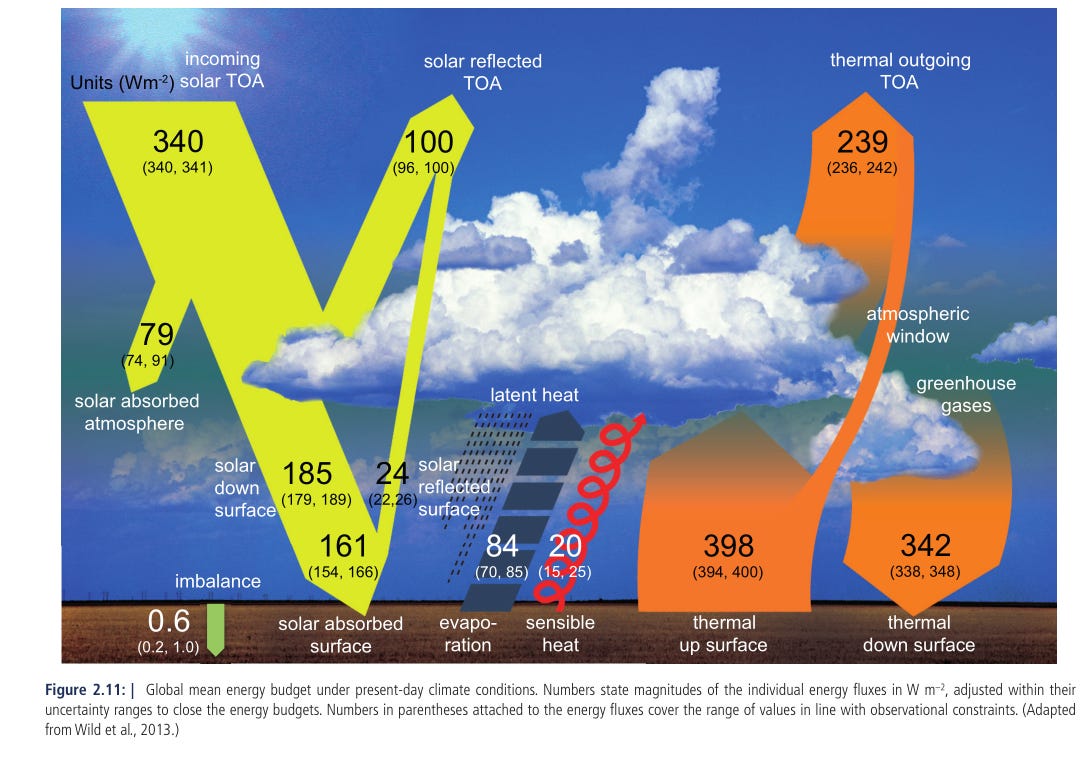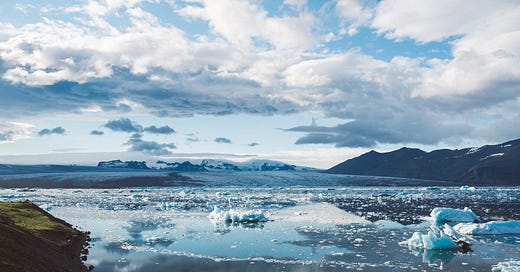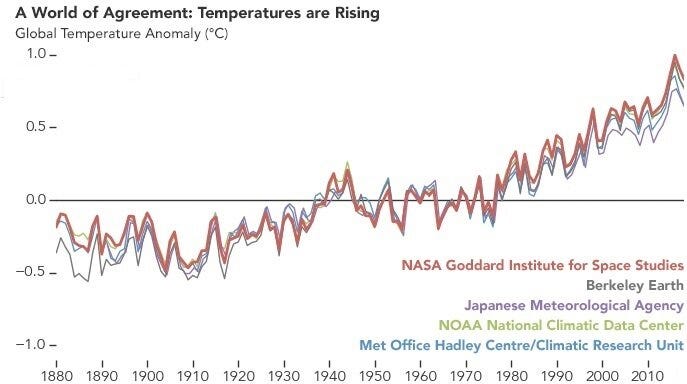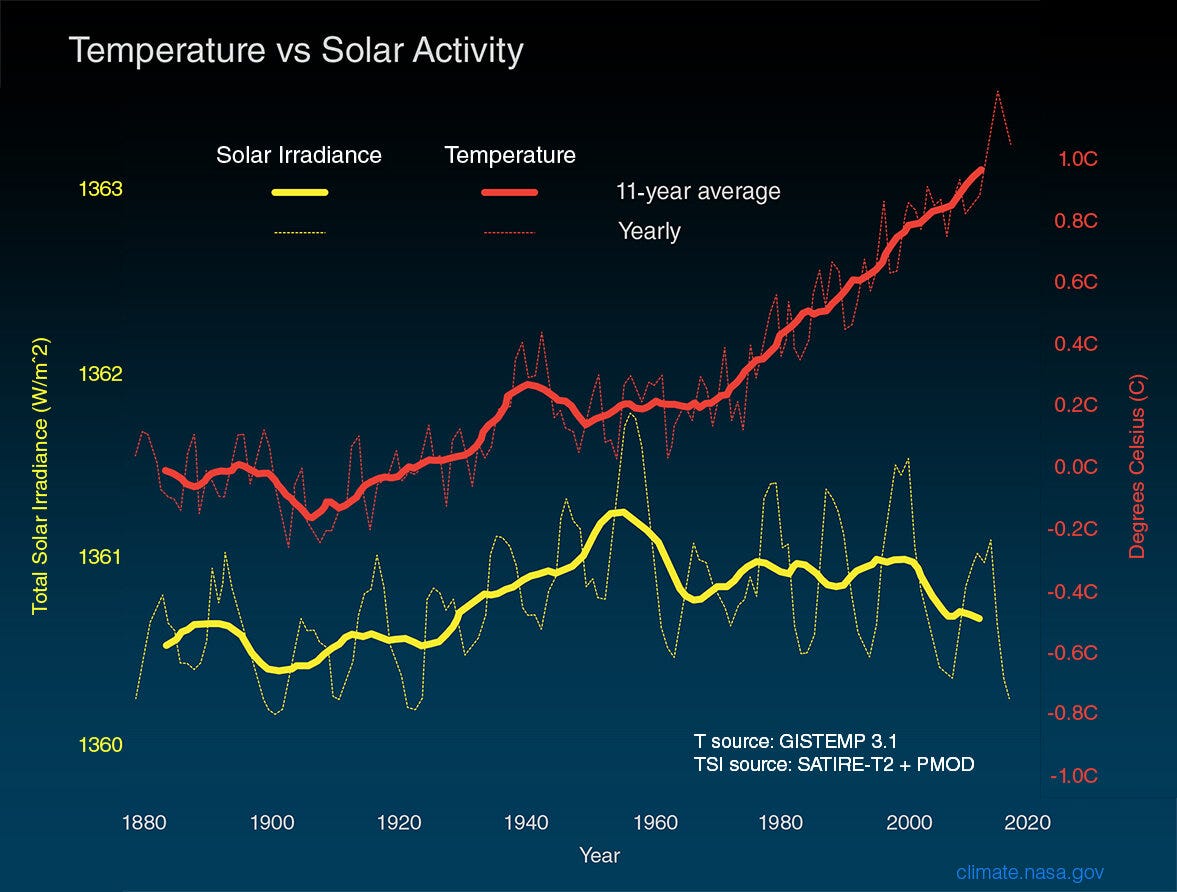Climate Change - Topics Explained
What is climate change?
Rising global temperatures (global warming) affect the Earth’s climate systems, by worsening and increasing the frequency of extreme weather events like droughts, floodings, and hurricanes, causing sea levels to rise, altering its seasons (drier and longer summers, warmer and shorter winters), ice caps and glaciers to melt, and ultimately species to go extinct and ecosystems we depend on to collapse. All these changes caused by global warming put together are often simply referred to as ‘climate change’.
What is global warming / the greenhouse effect? How does it work / what causes it?
Global Warming refers to the Earth’s increasing global surface temperatures over the past few centuries, and is caused by an ever-growing amount of human emissions that was largely set in motion by the Industrial Revolution. During this period, humans discovered the massive amount of energy that can be unleashed by burning the fossils that are contained within the Earth’s soil. The gases released by these fossil fuels trap heat in the atmosphere, however, much in the same manner as glass traps the heat in a greenhouse. That is why this warming effect has been dubbed the Greenhouse Effect. Greenhouse gases existed in the atmosphere long before humans walked the Earth, and we could not live here without them, as they keep the Earth’s average temperature at around 15ºC, instead of -18ºC.
To understand how we are amplifying the Greenhouse effect and thus warming the planet, take a look at the figure below, which is from the IPCC (Intergovernmental Panel on Climate Change, the United Nations body for assessing the science related to climate change.). On it you can see the solar radiation (“heat”) arriving at and leaving the Earth. When we compare the incoming heat from the sun (340 W/m2) to the heat (100 +239) lost into space, we can see that the system is in balance, and that the Earth loses about the same amount of heat as it gains. This is where the greenhouse gases we emit come in, as they block some of that ‘thermal outgoing’ heat, reducing that big 239 to something smaller. So even though the amount of greenhouse gases we emit is much smaller than those already present or emitted by natural processes, we are disturbing a delicate balance.

Doesn’t the climate change all the time?
Historically, yes. But this usually happens on timescales of thousands of years, not one or two centuries. The Earth’s climate has changed many times over the past, but not at the pace that is currently observed. Furthermore, massive changes to the Earth’s climate have been accompanied by mass extinctions or other catastrophic events.
For instance, during the Paleocene-Eocene Thermal Maximum, one of the most extreme examples of global warming in Earth’s history, global temperatures increased by about 5-8ºC. However, the temperature increase during this period, as well as the release of carbon that drove it, happened on a timescale of tens of thousands of years.
Wasn’t the Earth already warming, isn’t global warming a natural process that we can’t influence?
The Earth went through many cycles of warming and cooling through its lifetime. However, it is currently in a cooling period. Besides, the link between carbon dioxide (the most common greenhouse gas) in the atmosphere is pretty well established, and its varying atmospheric concentrations have been the cause of other major changes in the Earth’s climate in the past. So when fossil fuel emissions started rapidly rising from the 1950s onwards, global temperatures started rising as well.
![IPCC, 2014: Climate Change 2014: Synthesis Report. Contribution of Working Groups I, II and III to the Fifth Assessment Report of the Intergovernmental Panel on Climate Change [Core Writing Team, R.K. Pachauri and L.A. Meyer (eds.)]. IPCC, Geneva, S… IPCC, 2014: Climate Change 2014: Synthesis Report. Contribution of Working Groups I, II and III to the Fifth Assessment Report of the Intergovernmental Panel on Climate Change [Core Writing Team, R.K. Pachauri and L.A. Meyer (eds.)]. IPCC, Geneva, S…](https://substackcdn.com/image/fetch/$s_!NdFK!,w_1456,c_limit,f_auto,q_auto:good,fl_progressive:steep/https%3A%2F%2Fbucketeer-e05bbc84-baa3-437e-9518-adb32be77984.s3.amazonaws.com%2Fpublic%2Fimages%2Fb652d6b7-44d2-4285-986f-556be10506cf_669x1024.png)
Isn’t there still a lot of disagreement among scientists?
Estimates of consensus among scientists vary depending on the studies and research questions, but it can be safely stated that at least 90% of scientists agree with the science on global warming, and some studies have even stated statistics more in the range 97%. To explain this difference, it’s worth bearing in mind that the level of consensus is correlated with expertise in climate science. In other words, the more you know about it, the more likely you are to agree with the science.
Humans emit only a tiny fraction of global carbon emissions. The atmosphere, land, and oceans emit and absorb much bigger quantities of CO2 all the time.
True, but like we saw before, the Earth’s systems are in a delicate balance, with roughly the same quantities of CO2 entering and leaving the climate system. To get an idea of how we are affecting the carbon cycle, take a look at the figure below, which shows the way CO2 moves between land, atmosphere, and ocean.
Let’s start with vegetation. All the way to the left of the image, we can see how 121.3 Gigatonnes (Gt) of carbon enters vegetation/forests every year, plus 0.5Gt for coniferous forests (to the right). Of this 121.8Gt total, 60 is not absorbed by forests so returns to the atmosphere, 60 is emitted by the soil through all sorts of decaying processes, and 1.6 through forest/vegetation fires. Let’s do the math: 121.8 – (60+60+1.6) = -0.6.
Okay, so a bit more carbon enters the atmosphere than leaves it because of vegetation and soil. Now let’s move on to the ocean. When we look carefully at the arrows going from the ocean to the atmosphere and back again, we can see that the oceans emit 90Gt but absorb 92Gt. In other words, the ocean absorbs 2Gt from the atmosphere. This is why the ocean is referred to as a carbon sink.
So we’ve got -0.6 and +2, which means that 1.4Gt of carbon disappears out of the atmosphere every year, ending up in the oceans. Why is this the case? Well, all sorts of events can add more carbon to the atmosphere. Think of vulcanic eruptions, or massive once-in-a-century forest fires. Rarely occurring events can change the numbers in this cycle, causing more carbon to enter the atmosphere than usual. But since every year carbon disappears out of the atmosphere, this acts as a kind of correcting mechanism for those kinds of events.
However, there’s one arrow we haven’t looked at yet. Humans add around 5.5 (this number is still increasing every year) Gt of carbon to the atmosphere, disturbing this delicate balance. And that’s without looking at things like the cutting or burning of forests, which simultaneously reduces the amount of carbon that is removed from the atmosphere. To conclude: as more and more fossil gases build up in the atmosphere, they trap more heat and thus warm the planet.
How long can this keep building up? The terrifying prospect of abrupt change.
This is a question I would like to address now that we’ve discussed carbon cycles. It’s one of the big question marks regarding global warming. There are these thresholds which, once reached, will cause certain systems to change in a way that could very well be irreversible.
One of these could be the world’s oceans. As we’ve established, most (around 3/4th) of the extra carbon we add to the atmosphere and almost all (around 90%) of the extra heat we thus add ultimately ends up in the oceans, where it will be stored for hundreds of thousands of years. This in turn causes the oceans to acidify, with the infamous dying of coral reefs only one of the detrimental consequences. So the oceans have been acting as a kind of brake on global warming for now, but there’s only so much the oceans can take up before they change from a carbon sink into a carbon source. And we’re not exactly sure when that might happen. There’s many more of these moments where sudden, possibly irreversible change can occur due to the build-up of carbon. Another worrying example is that of melting glaciers. Since these have often existed for hundreds of thousands of years, they keep an enormous amount of greenhouse gases trapped. Once they melt, these could be released into the atmosphere, with catastrophic consequences. These moments are called tipping points.
The gas that is most commonly discussed when talking about human emissions, is Carbon Dioxide (CO2). Often, we’re talking about time scales of a hundred years when discussing the effects of this greenhouse gas. However, carbon dioxide is not the only greenhouse gas that we’re adding to the atmosphere. Other gases, like Methane (CH4), which are caused by human activities like keeping livestock, producing/using fossil fuels, and landfills, Nitrous Oxide (N2O), and the internationally banned Fluorocarbons (CFCs, HFCs, HCFCs, PFCs) can be even more dangerous, since they trap heat more efficiently than CO2 in magnitudes ranging from around 30 for CH4 to thousands/tens of thousands for Fluorocarbons. The release of these kinds of gases can therefore very rapidly bring about these tipping points, on a scale of only years. That is why a melting glacier can have such catastrophic consequences. For instance, last year scientists discovered that Iceland’s Sólheimajökull glacier is releasing amounts of methane comparable to 136,000 cows every year.
What about the sun, couldn’t it be warming?
The sun goes through many cycles, some lasting thousands of years, others lasting a few decades. The most impactful of these is its eleven year cycle, wherein its solar radiation (“how brightly it shines”) varies. During the last few cycles, this has caused variations in its radiation. These variations are estimated to cause global temperature variations of up to 0.1ºC. By contrast, global temperatures have increased by over 1ºC since the 1800s, with solar radiation even decreasing from 1986 to 2008, during which global surface temperature spiked. Basically, there are many different cycles that cause variations in global temperatures, but none of these variations are large enough to account for the warming observed over the past century.
Can’t humans adapt, like we’ve always done?
In a way, yes humans can adapt to a lot of things. The problem is that global warming acts like a kind of multiplier for threats. As global temperatures rise, so do droughts, floodings, storms, wildfires, crop failures etcetera increase in frequency and intensity. Just looking at the chaos that follows extreme weather events like a hurricane can give us an idea of how much worse it can get when more than one of these events hit at the same time. It’s very difficult, if not impossible to take adequate measures to protect yourself from all of the possible consequences of climate change.
As for the potential for adaptation, take a look at the IPCC figure below that’s summarised regional risks per region. The striped line is how much these risks can be reduced with high adaptation, which for the current warming trends (>3ºC by 2100) is less than half the total risk.
![IPCC, 2014: Climate Change 2014: Synthesis Report. Contribution of Working Groups I, II and III to the Fifth Assessment Report of the Intergovernmental Panel on Climate Change [Core Writing Team, R.K. Pachauri and L.A. Meyer (eds.)]. IPCC, Geneva, S… IPCC, 2014: Climate Change 2014: Synthesis Report. Contribution of Working Groups I, II and III to the Fifth Assessment Report of the Intergovernmental Panel on Climate Change [Core Writing Team, R.K. Pachauri and L.A. Meyer (eds.)]. IPCC, Geneva, S…](https://substackcdn.com/image/fetch/$s_!esGG!,w_1456,c_limit,f_auto,q_auto:good,fl_progressive:steep/https%3A%2F%2Fbucketeer-e05bbc84-baa3-437e-9518-adb32be77984.s3.amazonaws.com%2Fpublic%2Fimages%2F4fe18b84-7e72-44e1-a422-51fb3d368a65_1021x897.png)
Technologies like Geoengineering (think of things like putting certain gases in the atmosphere that reflect sunlight or trying to suck CO2 out of the atmosphere) are unproven and untested and could have a scary amount of possible side-effects like disturbing the Asian Monsoons that are used to feed billions of people, increasing droughts elsewhere, or permanently blocking out our sight of the night sky.
Why should we take action if others aren’t doing anything about it?
What if they’re thinking the same thing?
Won’t doing something about climate change hurt the economy / job market?
The costs of dealing with the effects of climate change by far outweigh the costs of doing something to prevent these effects from happening. Just like preventing crime costs less than dealing with it and preventing diseases is easier than treating them. Think about the costs of repairing a town after a hurricane, or how much revenue is lost after their crops fail to due to a drought. We’re talking hundreds of billions of dollars here, which is far more than any kind of climate action will ever cost.
What if it’s all a hoax?
It seems a bit far-fetched that thousands of scientists from all over the world, working separately from each other, all are conspiring together and falsifying literally thousands and thousands of peer-reviewed (meaning other scientists checked the research) studies, and are managing to keep a lid on it for decades, all the while fooling all the world’s governments and scientists into holding summits for decades (not to mention somehow causing hotter and hotter years to occur, melting ice sheets, and increasing the frequency and intensity of extreme weather events). Especially considering the fact that oil companies have found evidence of global warming as early as the 60s and chose to keep it a secret.
If your question or a question or argument that’s been thrown your way hasn’t been discussed here, have a look at https://skepticalscience.com/argument.php , where you can find a summary of most commonly used climate change myths and an accompanying response based on current scientific consensus.
Note: This post was first published on www.criticalconsent.com.







